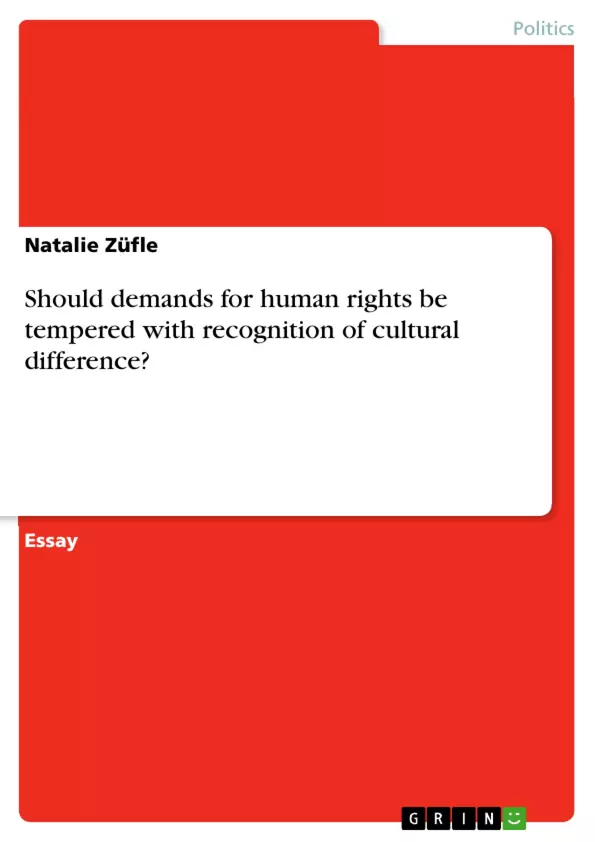At the very moment culture can at least not totally be left out as a factor with regard to human rights demands. However, cultures are not static, they are constantly evolving and challenged – also from within (Huysmans 2004, p. 323). Step by step it should be possible to leave culture behind. Last but not least, the strength of a universal human rights idea depends on a broad popular support all over the world – "then the shortcomings of Western leaders and the opposition of authoritarian rulers elsewhere will be of little long-run significance" (Brown 2008, p. 519).
Inhaltsverzeichnis (Table of Contents)
- Human Rights in Connection with Culture
- Cultural Relativism and Human Rights
- Brown’s Concept of a Universal Human Rights Idea
- Human Wrongs as a Tool to Promote Human Rights
- The Importance of Culture in the Context of Human Rights
Zielsetzung und Themenschwerpunkte (Objectives and Key Themes)
This essay explores the complex relationship between human rights and cultural difference. It aims to analyze whether demands for human rights should be tempered with recognition of cultural diversity. The main objectives are to: * Analyze the arguments for and against the universality of human rights. * Examine the concept of cultural relativism and its implications for human rights. * Discuss the idea of "human wrongs" as a means of promoting human rights. * Explore the dynamic nature of culture and its influence on the realization of human rights. * Highlight the importance of broad popular support for universal human rights.Zusammenfassung der Kapitel (Chapter Summaries)
- Human Rights in Connection with Culture: This section introduces the essay's core argument, exploring the tension between the universality of human rights and the reality of cultural diversity. It highlights the argument that cultures differ in their values and practices, potentially creating challenges for the application of universal human rights.
- Cultural Relativism and Human Rights: This section delves into the concept of cultural relativism, discussing its potential to justify human rights violations. It argues that cultural relativism can be used to protect existing power structures and that human rights are not universally relevant.
- Brown’s Concept of a Universal Human Rights Idea: This section presents Chris Brown's approach to promoting a universal human rights idea while acknowledging the significance of culture. Brown differentiates between generations of human rights and suggests a gradual process of promoting political rights first, before addressing economic and social rights.
- Human Wrongs as a Tool to Promote Human Rights: This section explores Brown's concept of "human wrongs" as a tool to facilitate the promotion of human rights. It argues that identifying and condemning clear wrongs, such as genocide, can help establish a universal basis for human rights even in the face of cultural differences.
- The Importance of Culture in the Context of Human Rights: This section emphasizes the constant evolution and dynamism of culture. It suggests that while culture should not be ignored in the pursuit of human rights, it is also not a static barrier to their realization. It also highlights the crucial role of popular support in promoting universal human rights.
Schlüsselwörter (Keywords)
This essay focuses on the crucial relationship between human rights and culture. It examines key concepts such as cultural relativism, human rights, universalism, human wrongs, and the dynamic nature of culture. The analysis explores the implications of these concepts for the realization of human rights in a globalized world.Frequently Asked Questions
Should demands for human rights be tempered with recognition of cultural difference?
According to the essay, while culture cannot be entirely ignored, it should not be seen as a static barrier. The goal is to eventually leave culture behind as universal human rights gain broad popular support globally.
What is the relationship between cultural relativism and human rights?
The text explores how cultural relativism is often used to justify human rights violations or protect existing power structures by arguing that universal rights are not relevant to all cultures.
How does Chris Brown suggest promoting universal human rights?
Brown suggests a gradual process, differentiating between generations of rights. He proposes promoting political rights first before addressing economic and social rights.
What is the concept of "human wrongs" in this context?
The concept of "human wrongs" involves identifying and condemning clear atrocities, such as genocide, to establish a universal basis for human rights that transcends cultural differences.
Are cultures considered static in the realization of human rights?
No, the essay emphasizes that cultures are dynamic and constantly evolving, meaning they are not permanent barriers to the realization of universal human rights.
- Quote paper
- Natalie Züfle (Author), 2009, Should demands for human rights be tempered with recognition of cultural difference? , Munich, GRIN Verlag, https://www.grin.com/document/180113



